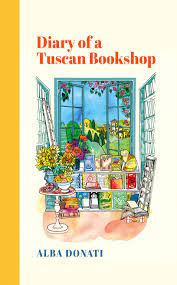I somehow hadn’t heard of Alba Donati’s Diary of a Tuscan Bookshop, despite it being the kind of memoir I always gravitate towards. Luckily, I spotted a copy in my local library, and found it to be the perfect reading for rather a rainy day, where I could transport myself to beautiful rural Italy through Donati’s words, which were translated into English by Elena Pala.

Prior to relocating to the small village of Lucignana in Northern Tuscany where she grew up, Donati lived a busy life in Florence where she worked as a publisher; this ‘made her happy but also left her feeling like a woman constantly on the run.’ A slower pace of life is something she strove for, and so she decided to open a small bookshop for the village’s 180 residents. As she writes in her first diary entry, ‘The idea for the bookshop must have been lying in wait, ensconced in the folds of that dark and joyous country we call childhood.’
The bookshop itself, which was named Libreria Sopra La Penna, opened in December 2019; Donati’s Diary of a Tuscan Bookshop begins over a year later, on the 20th of January 2021. Her second entry, written the following day, includes more background about her venture: ‘The idea to open the bookshop knocked on my door one night… It was the thirtieth of March 2019. I had the space: there was this little hill by the house where my mother used to grow lettuce… What I didn’t have was the money: opening a bookshop is expensive.’
It was lovely to see the tight-knit community’s effort involved throughout Donati’s reflections. When it began, the bookshop was ‘a project shared with 70 per cent of the village, volunteers doing shifts so that there would always be three people around at any given time…’. A lot of the money to enable the bookshop to open was also raised through a fundraising campaign.
As one might expect from this timepoint, Donati’s venture was rather affected by the COVID-19 lockdowns. She receives a lot of support from the online community in periods where the physical bookshop has to close, and visitors flock from local towns and cities as soon as lockdowns are lifted and it is open again. Throughout, Donati is never downbeat, although she is open about the myriad challenges a new bookshop faces in the modern world; rather, she is appreciative of everything around her, in terms of people, the natural world, and the books she so loves to read. Her focus on the small positives was a real breath of fresh air in the quite bewildering world of narratives occurring during the pandemic: ‘The pandemic (despite itself, I’m sure) gifted us these new rituals. It gave us our Sundays back, it gave us time with nothing to do and nowhere to go. Time for ourselves, for the little things.’
Something I found quite charming about Diary of a Tuscan Bookshop is that each entry ends with a list of the books purchased on that particular day, both in-person and online. If you are reading this review, I am sure that this little delight of a book will appeal to you, and I hope you enjoy the reading experience as much as I did. Even in translation, Donati’s voice is so soothing, and the book’s pace is delightful. Diary of a Tuscan Bookshop exemplifies just how magical books can be, and how they have the power to bond us together during the most difficult times.